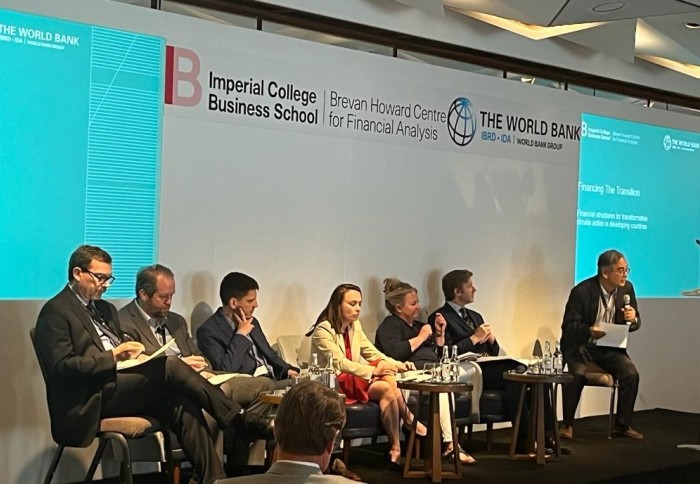Imperial and The World Bank aim to unlock investment for just energy transition

Speakers at an event hosted by Imperial College Business School with The World Bank
Imperial and the World Bank have convened global finance experts to discuss the financial structures needed for transformative climate action.
At the event, hosted by Imperial College Business School’s Brevan Howard Centre for Financial Analysis and the World Bank, academics, global policymakers and leaders from the financial sector explored how to deliver investments at scale for low and middle income countries (LMICs) and emerging economies to enable urgent action on climate change.
The talks explored the financial aspects of the energy transition, de-risking green investments, decarbonising transport, equipping LMICs to attract commercial climate finance and tapping international carbon markets.
Keynote speakers included Gabriel Yorio González, Mexico’s Deputy Minister of Finance and Public Credit, Dr Mohamed Gawad Alla, Minister Plenipotentiary (Commercial), at Egypt’s Ministry of International Cooperation, and Abyd Karmali, Managing Director, Environmental, Social and Governance Advisory at Bank of America.
Imperial has committed to using its influence through investment, research, education, sponsorship and other actions to accelerate the transition to net-zero.
"We are pleased to work with the World Bank to deepen these important discussions and accelerate change to support global climate goals.” Professor Mary Ryan Vice Provost (Research and Enterprise)
The Brevan Howard Centre for Financial Analysis, led by one of the world’s most respected economists,Professor Franklin Allen – aims to serve as a bridge between the Business School and the world of business. Its experts help drive a greater understanding and more efficient management of risk, promoting investment and productivity.
The World Bank is the largest provider of climate finance to LMICs with commitments to increase these levels to 35% of total investments, 50% of which would go to helping countries adapt to climate impacts.
Professor Franklin Allen said: “Amidst much progress on climate change, there is still substantial uncertainty on how different sources of funding can be structured to pay for needed climate action.
“As the world moves from the achievements of COP26 in Glasgow to the promise of COP27 in Egypt, greater clarity is needed on the financing structures to coordinate available climate resources in a timely and fair manner and the roles of key actors including finance institutions, commercial investors, as well as national governments.”
A disproportionate impact
LMICs have contributed the least to climate change, but are expected to bear the brunt of its impact, being disproportionally affected by extreme weather, drought, flooding, and conflicts over natural resource.A combination of geography and low income also makes mitigation and adaptation to climate change much more difficult.
While climate finance levels are increasing, including from private investors, international public funds and carbon markets, the structures to combine these sources and deliver investments at scale for LMICs to address climate change have yet to be established.
Under the UN climate convention, the EU and 23 industrialised countries pledged to collectively mobilise $100 billion of annual climate finance for LMICs, but experts say this will still fall well short of the trillions of dollars of yearly investments needed.
Convening power
Professor Mary Ryan, Vice Provost (Research and Enterprise), said: “All climate action must involve a just transition that protects the vulnerable segments of society disproportionately impacted by climate change and negatively impacted by decarbonisation.
“Imperial has the expertise, influence and convening power to make a difference and we have committed to doing so. We are pleased to work with the World Bank to deepen these important discussions and accelerate change to support global climate goals.”
Jonathan Coony, Sr Climate Finance Specialist at the World Bank said: “Not only must we increase levels of international public climate finance to LMICs, but we must also change how it is programmed to maximize mobilization of other funding sources, notably commercial investment and carbon markets.”
The Financing the Transition event follows a similar workshop in October 2019 on Green Financial Reform in Developing Countries.
Article text (excluding photos or graphics) © Imperial College London.
Photos and graphics subject to third party copyright used with permission or © Imperial College London.
Reporter
Laura Singleton
Communications Division
Deborah Evanson
Communications Division